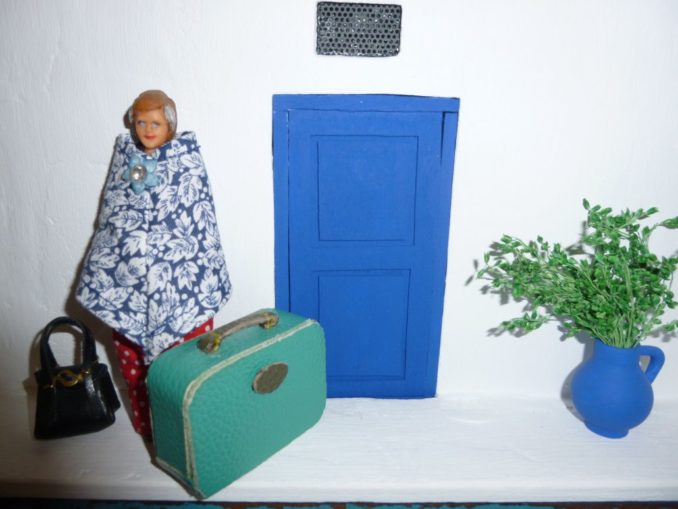
Ida pushed the cottage door open, walked in and started looking around. The acrid smell inside was so overpowering that she hurried, nearly gagging, to open all the windows wide. Ida felt nervous: she had been the Andrei Sakharov Dissidents’ Campsite’s cleaner and caretaker for four years now. As of today, she had become their interior designer and decorator as well.
Dissidents’ campsites around England received so many applications for accommodation that they had run out of space. So they had started buying derelict cottages, flats and houses in nearby villages to let to new dissidents. Ida had grown up in the Devon village closest to the Andrei Sakharov Campsite and had returned to live there permanently four years before. The whole village had long been converted to dissidence by the time the prodigal daughter arrived, which to Ida, in her circumstances, had been a lifesaver.
The cottage had belonged to an elderly widower with what is euphemistically called “mental health issues.” The fact that he drank at least three bottles of cheap wine a day was unlikely to have helped. He had no friends and only ventured out to buy wine at the same time every day. He took little care of himself and, as Ida remarked exploring what had been his home, even less care of his surroundings. His only child, a daughter about Ida’s age, had had clearance men remove all his belongings, which Ida suspected was a blessing. The ladder leading up to the top floor was missing several rungs, mould grew freely on the kitchen walls and ceiling, the floorboards were rotten. Still, it was a pretty place, of perfect proportions and with nice features.
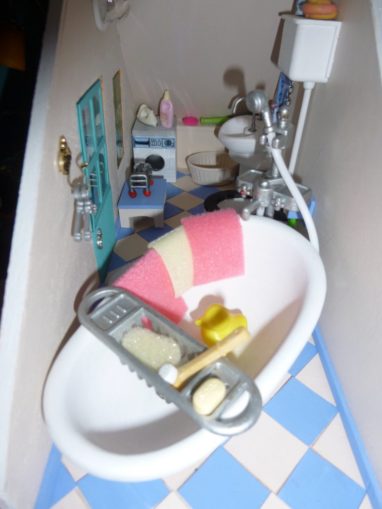
Ida took out her sketchbook. She had to work fast. The cottage was intended for two young couples, one of whom had a small child. There were just two rooms, but they were large and an extension could be added later to be used as a nursery. Their situation was so dire, as long as they were safe they were unlikely to be fussy.
Still, as this was her first commission from the Campsite, it was vital that she make a success of it. The woodwork was the first thing that needed attending to. Ida took out her trusted pay-as-you-go Nokia and called Savannah, the campsite carpenter, who said she would be there in five minutes.
“I’ll make a new ladder today,” said Savannah. “The ceiling beams are sound, they just need stripping.”
She examined the floor.
“The boards are not as bad as you thought, Ida, just covered in grime. Only a couple need to be replaced. I’ll bring a sander tomorrow. The cottage being empty, it won’t take long.”
Together, they went into the kitchen. The floor was a blackish mess. Savannah took a screwdriver out of her boiler suit pocket and started scraping a small area.
“Look at this, Ida!” she exclaimed, “those tiles are nice and not a single one of them is cracked.”
After Savannah had returned to the campsite to get started on the ladder, Ida brought her mop and bucket into the kitchen. An hour, and half a dozen buckets of filthy water, later, a beautiful antique floor emerged. Ida gave it a coat of linseed oil and moved on to clean the sink. The old man’s fridge and cooker had been left behind for some reason. Though they needing a thorough scrubbing like everything else, they looked relatively new and would be more than welcome. The young couples, at present hiding at a dissident-owned hotel in Exeter, had only a few suitcases with them. Ida would have to see about buying second-hand furniture among other things.
Back home that evening, Ida studied her colour charts and wrote a list of local junk shops she lifted off the phone book. Dissidents were taught to shun the Internet in favour of traditional communication methods such as letter writing. It the end, the list remained mostly unused. On their way to Barnstaple in Savannah’s van, they passed a skip from which they retrieved a large wardrobe, crockery, pots and pans, and sundry bits of furniture, which once repaired by Savannah and repainted or cleaned by Ida proved rather pretty.

To her own astonishment, Ida worked steadily and fast. At the beginning of April the cottage was ready for the new dissidents to move in. It was still light when Ida got home that day and decided to open a bottle of wine as a form of solitary celebration. After the first glass, she knew this had been a mistake: she rarely drank nowadays for it made her maudlin and brought back the memories. Ida should have stopped drinking there and then. Instead, she lit another cigarette and poured herself a second glass of wine. Suddenly, the memories engulfed her. She felt herself drowning in shame and self-loathing.
Ida was Jewish. Her real name was Nudelmann. An only child born to middle aged parents, she grew up in a cold and unemotional atmosphere which fuelled her resentment. She was far too heedless to ask herself whether the fact that both her mother and father had come to England as Kinder Transport might have altered their character. She spoke fluent German, but never attempted to learn to read or write it. Her parents wanted her to go to university, but she was careless and inattentive at school with the result that she left at 16 without any qualification whatsoever. She moved to Bristol where she found a job as a sales-assistant at a large department store. She kept vaguely in touch with her parents, writing or phoning briefly on average every six weeks.
For the first twenty years, her life was uneventful. She kept her job at the department store although she never worked hard enough to earn a promotion, lived in a small ugly flat she hated, sometimes went to the cinema with friends from work and had a couple of boyfriends, but nothing serious. When she was 35, her parents died within a few weeks of each other. Ida inherited their cottage and simply ignored it. She had the utilities turned off; and that was that.
It was at the time when mobile phones became all the rage. Everyone had to have one, if not two. To her credit, Ida who hardly ever called anyone, resisted the trend for a long time. Then one day, prompted by well-meaning colleagues, she gave in and walked into a mobile phone shop. The sales assistant, who turned out to be the owner, was a shy young man from the Indian Subcontinent, with one of the sweetest voices Ida was ever given to hear. Was it because of that mellifluous voice that Ida did not notice he had dead eyes? He was helpful, possibly to excess, and half an hour later a delighted Ida came out of the shop with a cute silver grey phone so small it fitted in the palm of her hand.
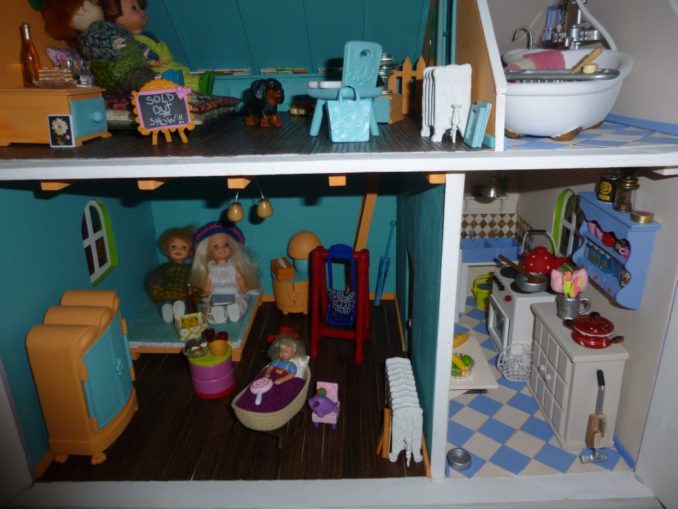
Unfortunately, Ida was not in the least technical. Two days later, she was back at the shop having inadvertently blocked her new phone. She admired the swiftness with which the young man solved her problem. For some reason, although Ida had never been particularly sociable, they started chatting. His name was Khan and he had been born in Pakistan moving to England when he was 18. He had a forename, but Ida had sworn to herself never to utter it again, not even in thoughts. It was a hideous name, anyway. Much later, she was to find out that he had lied about almost everything. He was much older than he claimed and had never been a permanent resident in this country. Lying was second nature to him.
Khan pretended that he loved the English countryside and would love to take Ida for a picnic by the river. They arranged to meet at his shop on the following Saturday around eleven o’clock. When Ida turned up for their date, the shop was mysteriously closed and Khan was nowhere in sight. Inattention was Ida’s principal character defect. If for once in her 36 years she had paid attention, it is quite likely that her life would have remained uneventful.
Khan called her on her mobile on the following day. He was full of apologies. A friend of his had had a terrible accident and he had had to drive him to hospital. Although Ida was not particularly perceptive, she sensed that he was lying. She never understood why she chose to ignore it. Their picnic was pushed back to the following Saturday.
If Khan was in the habit of lying to others, often for no reason, Ida on the other hand lied to herself. There was nothing outstanding about their first date. The spot Khan had picked was not picturesque by a long stretch; the food was bland, if not outright stale, and the conversation stilted. Yet, Ida convinced herself that it had been the happiest day in her life. Of course, Khan told Ida that he liked her a lot. Of course she allowed him to kiss her. Of course he begged her to marry him. So many things had happened since, Ida hardly remembered that day. If it had been as blissful as she pretended at the time she would never have forgotten, she told herself many years later.
For about a week, Khan showered Ida with attention. He sent her cards smothered in tiny red hearts, brought her greasy Oriental pastries and half wilted flowers with a cloying smell. Above all, he made all sorts of promises he had no intention of keeping. Eight days into their connection, Khan told Ida a long winded story about being unable to pay his (rather large) phone bill on account of dishonest customers who owed him a lot of money. Although the tale made no sense, Ida who had some money saved away offered to lend him the sum. It was accepted with crocodile tears of gratitude and returned soon afterwards in used five Pound notes strangely enough. It was to be the only time Khan ever repaid Ida when he borrowed money.
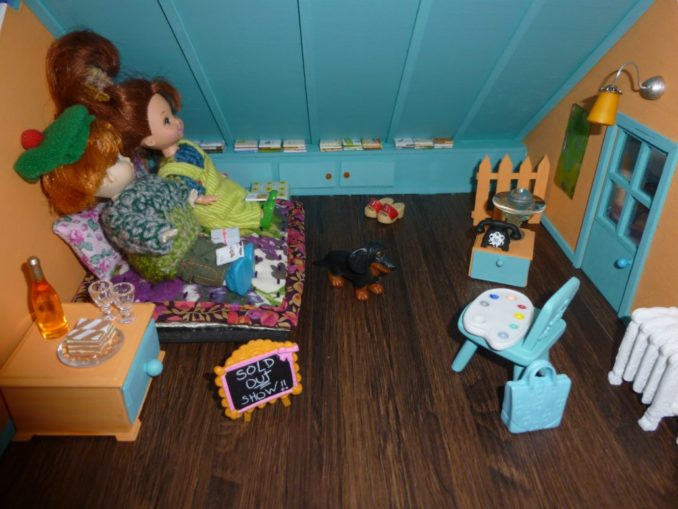
I have trouble calling their association an affair, or even that vague and vulgar neologism, “relationship.” The truth is that Ida never loved Khan and hardly ever saw him after the first week. Whenever he phoned or visited, it was to relate yet another tale of woe and borrow even more money. His beloved aunt in Pakistan needed to be admitted to hospital urgently, his parents had to pay a huge bribe to the police or their land would be stolen by the local warlord. As Khan spent most of his time in Pakistan, Ida became Eastern Bunion’s most faithful customer. She doubted, paid, and did not want to know.
After two years of this, Ida’s savings had evaporated and she began to feel the pinch. She should have turned her back on Khan there and then and, even better, moved away from Bristol. Instead, she started working overtime at the department store. Khan claimed he could not visit her at her flat on account of her neighbours being racist. Ida, who now had a hard time paying her rent, agreed to move to a squalid hotel room. Many years later, she was to find out that Khan part owned the hotel and therefore received fifty percent of what she paid.
After four years of this regime, Ida wished ardently she could walk out on Khan, the sordid hotel room, and her whole life, but did not know how to do so. She had become apathetic and, to boot, drank heavily. Time had been abolished: she lived a day to day existence; the past and future no longer existed. Khan had cast doubt on her few friends from the start; they were unreliable, dishonest, and spoke ill of Ida as soon as her back was turned. The result was that Ida was now completely alone. He had also insisted that she keep their dalliance a secret as the British are notoriously racist and Ida, never much of a talker, had foolishly complied.
For some unknown reason, Khan had always avoided Ida’s place of work. One day, her supervisor, a kind and attentionate older man, handed her a letter which had arrived from Israel that very morning. Ida read with pleasure that her cousin Yair, whom she had not seen since he was a toddler, would be visiting Bristol in a fortnight’s time. Ida kept this from Khan. If truth be told, he knew as little about her as she knew about him. For some reason, she had never told him she was Jewish, nor where she had been born, let alone that she owned property in her native Devon.
Ida met Yair at the airport. He had grown into a muscular, medium height man with coarse black hair, navy blue eyes and a winning smile. Ida felt immediately safe in his company. He told her that after the army and university, he had joined the narcotics department of the Jerusalem police. Ida told Yair as little as it was polite to do so. Over the years, guilt, confusion and shame had made her more secretive than ever. Still, they met every evening, went sightseeing and ate dinner together.
On the first Saturday after Yair’s arrival, Ida was due to meet him at his hotel at nine in the morning. He had hired a small car and they planned to tour the countryside together. After the war, Bristol City Centre was disfigured by brutalist architecture. As Ida was walking past one of those blots on the landscape, she noticed a brand new Mercedes parked outside. Khan, whom Ida had not seen or heard of for three weeks, was sitting in the back, handing a small white packet to a girl about twelve years old with glazed eyes and a dazed look on her pale face. Khan had a smile on his thick lips. Later, the only word which occurred to Ida the atheist to describe it was “satanic.”
Ida felt as if her insides had suddenly caught fire, but she did not stop in her tracks. She was sure Khan had not seen her and the unfortunate girl was past noticing anything. Ida ran the last few yards to Yair’s hotel and did not stop until his room door had closed behind her. As was her wont, she meant to keep what she had seen to herself. Beyond this, she had no plan. But Yair immediately noticed her pallor, made her sit in the armchair and brought her a glass of cold water. Ida had not realised how thirsty she had been. She drank it in one gulp, and it was then that the last five years started pouring out uncontrollably.
She had barely finished the second sentence than Yair raised his hand.
“Give me your mobile phone, Ida,” he said in a tone which brooked no opposition.
Ida complied, relieved. She had grown to loathe the little object in her handbag. In one swift gesture, Yair erased all the data from her phone, switched it off, removed the battery and SIM card. This he slipped in his shirt pocket. The battery he dropped in the wastepaper basket. He wrapped the now dead phone in several layers of paper tissues, inserted the thick bundle into a plastic bag which he knotted tightly, then put it in the bathroom bin and closed the door.
“Now you can tell me everything,” he told Ida.
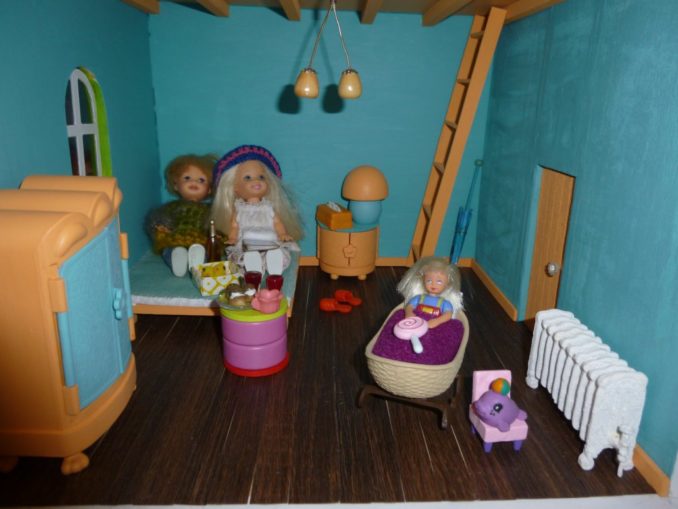
“We must leave now,” said Yair when Ida had concluded her story. “Don’t waste your time informing the British police. At best, they turn a blind eye, at worst they’re actively complicit, which comes down to the same thing.
“Is there anything you need from your room?” he resumed after a pause.
Ida thought for a minute then shook her head in disgust.
“I want nothing from that life,” she stated.
Yair packed quickly, paid his hotel bill, then he and Ida drove off in his rental car. It was not until they had been on the motorway for three quarters of an hour that Ida asked where they were headed.
“It’s always best to escape via an indirect route,” answered Yair knowingly. “So I thought we’d spend a few days in Salisbury. My friend Tameer has a hotel there. He’s an ex-Muslim, so you can trust him completely.”
Tameer, a quiet Egyptian man with sorrowful eyes and a slight stoop, was indeed trustworthy. His charming hotel with a large terrace near the cathedral was extremely popular with Israeli tourists. Ida wavered between two options: follow her cousin to Israel, or move back into to her parents’ cottage in Devon. In the end, she chose the latter. Khan had been physically as well as intellectually lazy. His sort usually are. He believed Ida to be so in thrall to him, he had never bothered to find out about her past. The truth is that Ida as a person had never interested him. To him, she had been a cash machine, nothing beyond that and, if truth be told, he had more than one woman for that very purpose. From then on, Petra Ida Nudelmann called herself Mrs. Ida Noodle. Khan had never heard her middle name. He might not even have known there was such a thing as middle names.
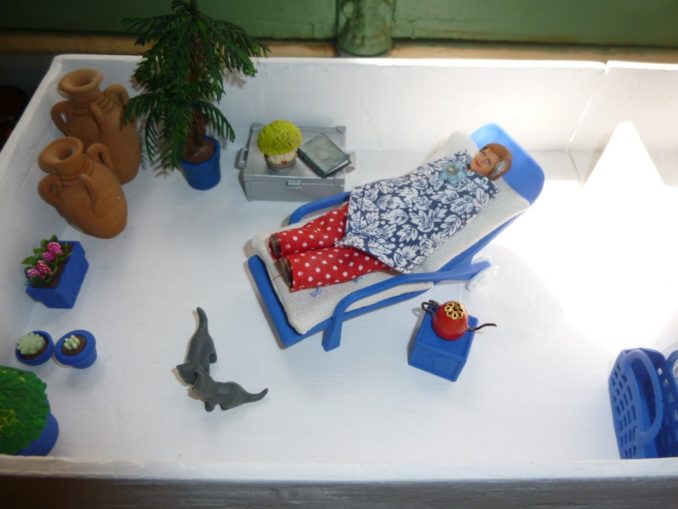
“What if Khan finds me anyway?” She asked Yair when they finally parted.
“He won’t,” said Yair.
At first sight, the village had changed little. The neighbours Ada had called Granny and Granddad Wilson since infancy still lived next door and welcomed her as if they had never parted. It was Granny Wilson who first raised the issue of a job.
“I don’t know,” moaned an apathetic Ida.
“Tom’s become chums with a gentleman our age over there at the new campsite. Simon Cohen’s his name. He said they needed a cleaner and caretaker for the showers, office and whatnot. They even have a library now, or so Tom tells me. Mr Cohen’s wife runs it.”
Ida applied without much faith, was interviewed first by Dasia (which was scary), then by Gideon (which was not as scary), and was at last hired.
And so a new, happier life began, but the more Ida got to know the residents of the Andrei Sakharov Dissidents’ Campsite the more shame she felt at her lack of education. She was in awe of Simon Marmeladov, by now a Greek scholar, feared Dasia for no reason she could have pinpointed, and felt humble around Gideon, his wife Rosie, and even Galta the sculptress. Still, she became good friends with Lucy Cohen over at the library and noticed one day that her husband had started spending a lot of time there.
“He’s trying to learn Russian,” whispered a giggling Mrs. Cohen in Ida’s ear.
“Is that right?” asked Ida. “Does that mean you have books in other languages than English?”
“Oh yes!” Answered Mrs. Cohen. “We have all the classics in Latin, Greek, French, German, Italian and Spanish as well as a number of Russian books Dasia provided.”
And so Ida, who had hardly ever read a book in her life, devoured Goethe, Heine, Schiller, Novalis, Hoffmann and Thomas Mann. Every time she returned a book, and she did that more and more quickly, Mrs. Cohen suggested half a dozen new ones. Ida fell in love with Stefan Zweig and Leo Perutz. Kafka and Musil she did not like as much. After a while, she was given letters to translate to and from German which brought her additional income.
Even so, Ida still felt something was missing from her life. Her guilt, shame and self-hatred had lessened over time, but resurfaced unexpectedly although she had given up drinking in Salisbury. For a long time, Ida had believed that Yair popping up just when she needed him most had been sheer luck. Then, last Summer, Simon Marmeladov had let slip that Dasia was friends with an Israeli called Yair.
“Oh, I have a cousin in Israel also called Yair!” exclaimed Ida innocently. “What does yours look like?”
“About 35,” answered Simon, “but probably older. Medium height, but athletic in a broad-shouldered sort of way, coarse, short black hair and navy blue eyes.”
It was the “navy blue eyes” which clinched it.
“How did Dasia and Yair meet?” Wondered Ida, “and how long have they known each other?” Yair and she had kept in touch via letters, as they had done all their lives, and she saw Dasia from time to time at the campsite. Still, she dared ask neither of them.
One bright but cold Sunday in March, Ida picked up a colourful leaflet from one of the library’s d
 isplay tables. It advertised an interior designing course for adults. Ida fell in love with the photographs at first sight and read the leaflet attentively.
isplay tables. It advertised an interior designing course for adults. Ida fell in love with the photographs at first sight and read the leaflet attentively.
“Oh, do sign up, Ida!” said Mrs. Cohen whom she had not heard approach. “I know the people who run it; you’ll love it.”
And love it, Ida did. She had at long last found her vocation and excelled at it. At the end of the happiest year of her life, she passed her exams with flying colours and earned her diploma. Her first job as a new minted interior designer and decorator was to turn her parents’ cottage into a little gem much admired by all her friends.
Ida emerged from her reverie, cursing herself. She should never have drunk, it brought back all her bad memories and she had to be at the cottage early tomorrow morning to give it one last clean before the young dissidents moved in.
Ida was busy dusting the kitchen early the following afternoon when she heard a car pull up outside the cottage. She froze realising how alone she was, inched towards the window and peered outside unseen. A small brown dog leapt out of a familiar red Mini. Ida let her breath out and went to open the door, which Pavlov was already scratching impatiently, to Dasia.
“Good afternoon, Ida,” said Dasia. “I’ve come to have a look before the new dissidents arrive and give you your prize.”
“I never knew there was a prize,” said Ida in genuine surprise.
“Judging by this room alone, you should have won more than just one,” said Dasia.
Ida waited nervously while Dasia with Pavlov on her heels inspected the upstairs rooms. When she came back down, she handed Ida a long envelope.
“It’s a ticket to Greece,” explained Dasia before Ida had even had time to look inside.
“I’ve never been abroad,” mumbled Ida.
“You’ll love it,” Dasia went on. “Simon’s lending you his house on Santorini for two weeks.”
“But Simon always goes to his house in Greece in the Spring,” faltered Ida.
“Not this year,” said Dasia. “Sonya’s giving birth in a few days. Simon wants to be here for his second grandchild.”
Ida’s heart did a somersault in her chest. She had always secretly wanted to visit Greece.
“And here’s your vaccination passport,” said Dasia handing her a small booklet the colour of blood. “It’s a fake, needless to say. I have them sent to me by the gross from Georgia and Armenia where I have good friends with a printing press.
“One last thing before I forget. There’s a tiny sealed envelope at the back of your ticket. Don’t open it until you’re safely in Simon’s house.”
Ten days later, Ida stepped off the ferry in Thira carrying just her handbag and a small suitcase. She had spent three heavenly days exploring Athens. Simon had promised she would be met by friends as his house tucked away in a narrow street was rather hard to find. Two young women with a skye-terrier stood smiling holding a piece of white cardboard which just read “Ida.”
“Welcome, Ida,” said the taller of the two. “I’m Tilly and this is Caddy.”
They shook hands warmly.
“What’s his name?” asked Ida petting the dog.
“Dougal,” answered Caddy.
“Did you have a good crossing?” asked Tilly.
“It was wonderful,” said Ida sincerely.
“Simon phoned just as we were leaving,” said Tilly. “He had a granddaughter this morning. We could hear him jumping for joy at the other end.”
“How’s Sonya?” inquired Ida.
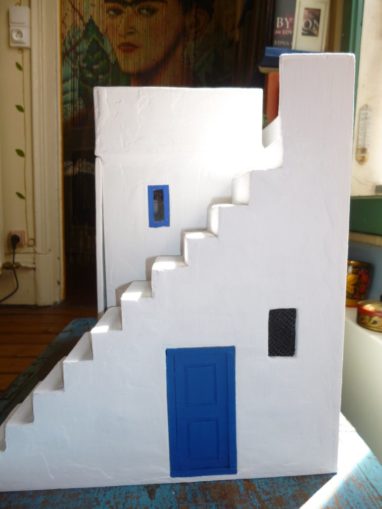
“She can’t wait to go home,” said Caddy. “Her dog is the only family member not allowed to visit her and the baby in hospital and she misses him sorely.”
“The baby’s name’s Audrey, after Rodion’s sister,” said Tilly. “The christening is in June and Simon’s asked Caddy to be godmother, so we’ll be flying there in two months’ time.”
“You’ll have to stay with me,” offered Ida. “I’ve lots of spare room in my cottage.”
“That’ll be great,” said Tilly gratefully. “At least a thousand dissidents from all over England will be there, so that’ll save us having to sleep under a tent.”
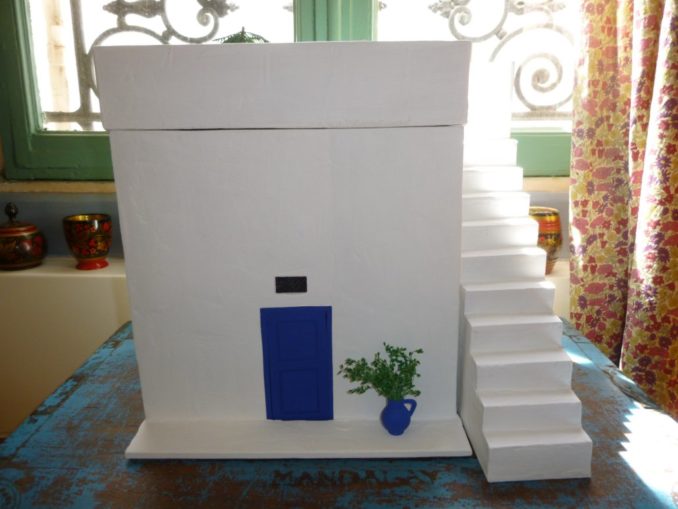
“Especially if the weather’s miserable,” laughed Caddy.
The house was small but beautiful, gleaming white with a terrace on the roof.
“Simon uses the space under the terrace staircase as his study,” explained Tilly unlocking the door. “The shower and toilets are under the inside staircase. We’ve put logs in the basket as it still gets chilly at night and we’ve left a meal in the fridge in case you’re too weary to go out again.”
Tilly and Caddy promised to come back the following evening to take Ida out to dinner and left. She went up to the mezzanine, dropped her suitcase on the bed and took her sketchbook out. Once back downstairs, she looked around carefully.
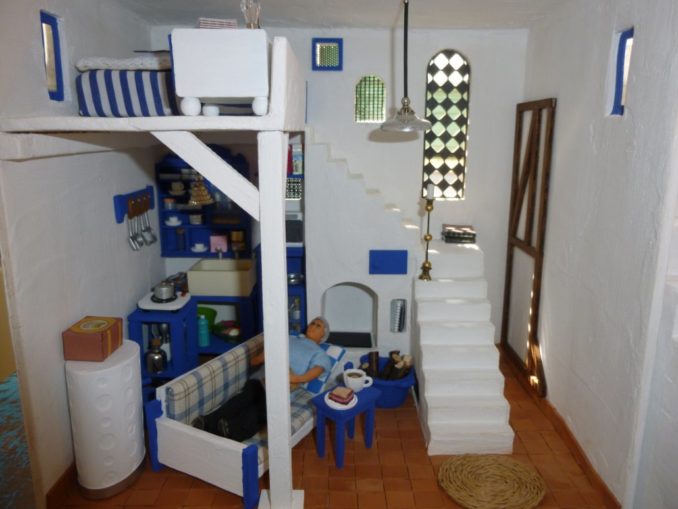
“Our ancestors really knew how to build houses,” she thought.
It was indeed getting chilly. She got off the sofa, lit the fire and sat back. It was then that she remembered the tiny envelope Dasia had told her not to open until she was in Simon’s house. She fetched her plane ticket from her handbag and found the envelope still hidden at the back. Her hands shaking, she slit it open with a knife that had been left next to the kitchen sink. Inside was a small cutting from the Karachi Post dated just three weeks before. Khan and three other men had been killed when their expensive foreign car had plunged into a ravine. It was believed that the breaks had failed. The four men were described as international drug dealers and general miscreants. Ida marvelled at the fact that Pakistani journalists were allowed to use such a word as “miscreant.”
Ida tossed the article and envelope into the fire. In less than a second no trace of them remained. She opened her sketchbook and started drawing Simon’s Santorini house.
© text & images Doxie 2021
The Goodnight Vienna Audio file
Audio Player


